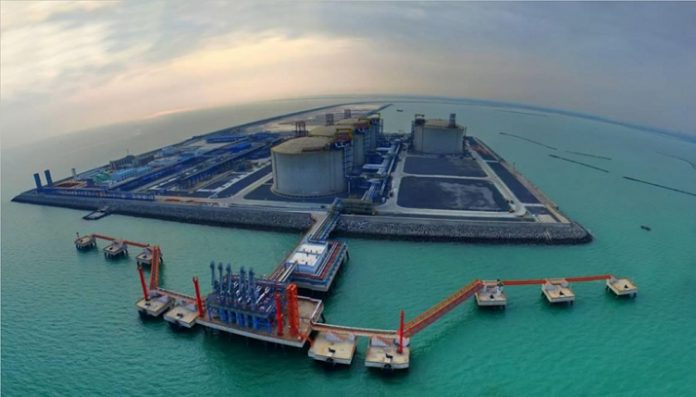
LONDON: Pakistan’s Engro said on Wednesday it will be a year before it can go ahead with a new liquefied natural gas (LNG) import terminal as domestic gas regulations need clarifying and new pipeline commitments are required.
The chemicals-to-energy conglomerate also said friction with the new government of Prime Minister Imran Khan over the terms of the country’s first LNG import terminal, which the company operates, has had no impact on the progress of its LNG plans.
Royal Dutch Shell, trading house Gunvor and local company Fatima are partners in Engro’s second planned terminal which would be located at Port Qasim with a Floating Storage and Regasification Unit (FSRU) vessel processing the gas.
“My best guess is we need at least another year,” said Syed Ammar Shah, head of business development at Engro Elengy Terminal, adding his company was in advanced talks with a provider of the FSRU.
“We’re working with someone. The term sheets have been signed, we have conducted due diligence of the vessel, but I cannot say the name of the provider,” he told on the sidelines of a conference in London.
Engro would then need around 14 to 15 months to bring the project into operation, making a 2021 start-up date more realistic than 2020 as previously expected.
Pakistan imported 5.7 million tonnes of LNG this year thanks to two import terminals that began operations in 2015 and 2017. Together with India and Bangladesh, it is seen as a huge market opportunity owing to its large population and high gas usage.
However, meeting the growing demand for gas, as Pakistan’s indigenous supplies fall, is complex. Pipelines from the coastal south to northern regions are full and new ones are needed, such as a Karachi-Lahore pipeline discussed with Russia’s Rostec.
In addition, there is confusion about which sectors get which gas at what price, with domestic gas subsidized and cheaper than imported LNG, although the lack of clarity may not be a stumbling block, Shah said.
“There are two sectors right now that do not need that clarity which is the power sector and the CNG (compressed natural gas) sector and there is enough demand in both to support these terminals,” he said.
Pakistan’s new government has targeted for investigation business deals struck by the government of ousted premier Nawaz Sharif. The petroleum minister said last month the previous administration had paid too much for the first terminal.
However, on Wednesday Engro maintained its stance that not only the terminal, partly financed by the World Bank’s International Finance Corp, was globally competitive but that the contract could not be renegotiated.
“They (the government) said they want a discussion, but they haven’t actually contacted us,” Jahangir Piracha, chief executive of Engro Elengy Terminal, said, also speaking in London.
Asked if the spat delayed or influenced plans for the second terminal, he said: “I don’t think so, because I have a lot of faith in the Pakistani government. They have generally honoured all the contracts.”






